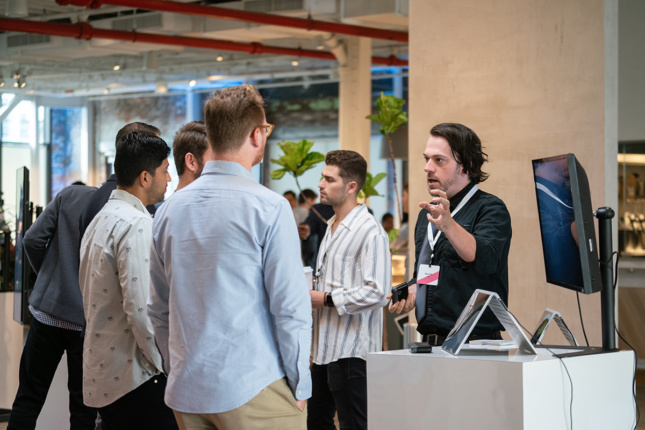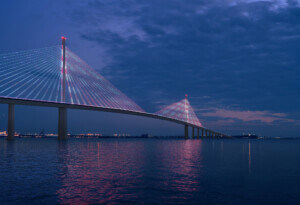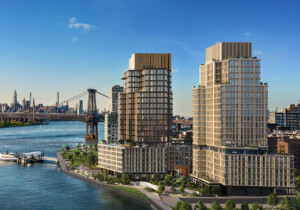This past Thursday, URBAN-X hosted its sixth demo day in Brooklyn at A/D/O, where startups that were showing what Micah Kotch, the startup accelerator’s managing director, called “novel solutions to urban life.” URBAN-X, which is organized by MINI, A/D/O’s founder, in partnership with the venture firm Urban Us, began incubating urban-focused startups back in 2016. Previous iterations have seen everything from electric vehicle companies to waste management startups, and for this session, the brief was intentionally broad, said Kotch. On display was everything from machine-learning solutions to building energy management to apps that let people buy leftover prepared food from fast-casual restaurants and cafes to prevent food waste and generate some extra revenue.
Pi-Lit showed off a networked solution to highway and infrastructural safety. Many lives are lost each year as people sit after accidents, or as construction workers operate in dangerous work zones. The California-based company has developed a smart solution of mesh-networked lighting that can be deployed by first responders or work on existing work zone infrastructure. In addition, they’ve developed an array of sensors that can be affixed to bridges, roads, and temporary barriers—which founder Jim Selevan says are prone to impact but without transportation departments being aware, leading to unknown compromises that can cause accidents later on. Sensors could also let relevant parties know if a bridge is vibrating too much, or when roads begin freezing and warnings need to be put out, providing users with “real-time ground truth.”
3AM also presented their plans for using mesh networks, with a focus on safety, as their program relies on drones and portable trackers to help support operational awareness for firefighters.

More whimsically, Hubbster showcased their solution—already deployed in Paris and Copenhagen—to support urban play: basically an app-based rental system for basketballs, croquet set, and everything in between, which would deploy from small, battery-powered smart lockboxes. Less glamorously but quite critically, Varuna is trying to make a change in the old-fashioned U.S. water infrastructure system, which exposes as much as 63 percent of the country to unsafe water and largely relies on manual testing, even for federally mandated across-the-board chlorine monitoring. They hope that by introducing AI-equipped sensors to utility systems, U.S. water can be delivered more safely, efficiently, and cheaply, addressing “operational inefficiencies in water supply, outdated tools, and a lack of visibility.”
Also working with utilities was the Houston-based Evolve Energy, whose AI behavioral classification solution, currently available in parts of Texas, allows electricity to be bought at wholesale prices at the times of day when it is cheapest, for the comfort and needs individual users value most. For example, a home can pre-cool with cheap electricity and then turn off when prices surge. Variable rates, a la airline tickets, were a common theme—for example, Food for All, an app that is designed to reduce food waste and create extra revenue for fast-casual restaurants, offers flexible pricing for customers to pick up food that might otherwise be tossed.
Most relevant to architects, perhaps, were Cove.Tool’s recent updates. The startup reports that they’ve made big strides on their cloud-based app that helps architect’s create efficient buildings. Reportedly cutting down energy grading from tens of hours to mere minutes, the app can now simulate the effects of sunlight—through various types glass—on utility usage, among many other new micro-climatic simulation features.











